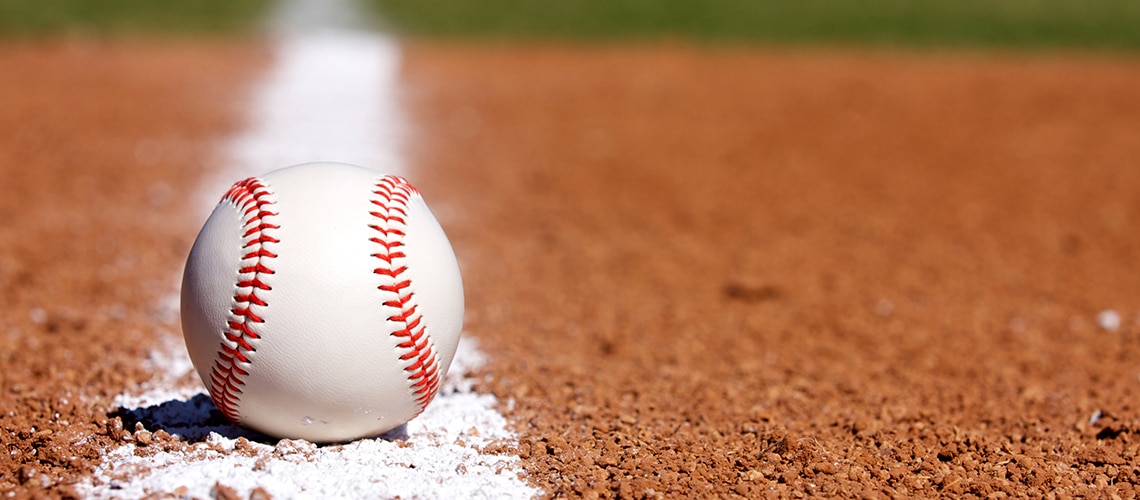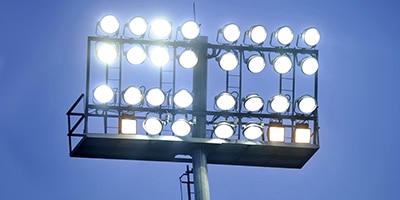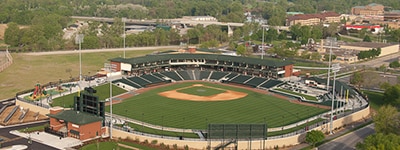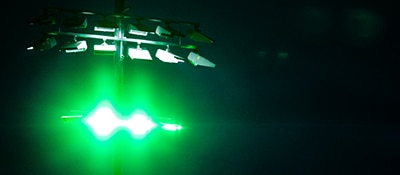
Feb 12, 2025 | Case Study | 4 minute read

Feb 12, 2025 | Case Study | 4 minute read
Materials science can help improve the fan experience in a favorite pastime enjoyed around the world—baseball.

Traditional stadium lighting.
In the world of sports, the quality of stadium lighting plays a crucial role in ensuring an optimal experience for both players and fans. For baseball specifically, quality lighting helps players track fast-moving balls accurately, reduces dark areas and shadows on the field that can lead to misjudged plays or injury, and enables fans both in the stadium and at home to better catch the action.
In 2022, after many seasons of use, the Great Lakes Loons club leaders determined it was time for a field lighting upgrade of their home stadium, Dow Diamond.
Let’s take a closer look at what that project entailed.

Aerial photograph of Dow Diamond circa 2021,
prior to the stadium lighting upgrades.
The Great Lakes Loons are a Minor League Baseball (MiLB) team and a Class A affiliate of the Los Angeles Dodgers. Based in Midland, Michigan, the Loons have developed a passionate fan base.
The Great Lakes Loons first game was played at Dow Diamond on April 13, 2007 in downtown Midland, Michigan. Since that first season, more than 3 million baseball enthusiasts have enjoyed watching the Loons and the sights and sounds of Dow Diamond.

The new Dow Diamond stadium lighting system
features color changing capabilities.
After conducting extensive research into LED sports lighting manufacturers, they chose to partner with a leading lighting vendor known for designing and installing advanced LED systems at numerous MiLB and MLB stadiums.
The lighting vendor customized a state-of-the-art lighting system utilizing Dow SILASTIC™ MS-1002 Moldable Silicone technology in the secondary optics. This system delivered improved on-field light levels and uniformity, patented glare control, better reliability from its complete system design, and reduced energy consumption.
The new system also includes special effects capabilities with color-changing technology and light-to-music synchronization for outstanding light shows during player introductions and to celebrate home runs and Loons wins.
Silicone materials create new possibilities for next-gen lighting. For example, moldable optical silicones for LED lighting are resistant to impact damage and degradation from UV, heat and harsh environmental conditions. Applying the latest breakthroughs in materials science results in long-lasting reliability, light output, energy efficient solutions and expressive lighting design.

The newly-installed LED lighting system at Dow Diamond has significantly enhanced the playing and viewing experience for the Great Lakes Loons and their fans.
This project also highlighted a unique partnership between the Loons, Dow, and the lighting vendor—showcasing the power of collaboration to support the evolving needs of sustainable stadiums with lighting systems that last. The moldable silicone technology component of Dow Diamond’s new lighting system is produced locally in Michigan by Dow, which is part of the lighting’s optical system and helps ensure the best possible light quality and uniform distribution across the field.
“Dow's roots in Midland run deep, so being a part of the Loons’ evolving story in our community has been extremely fulfilling,” said Carlos Padilla II, head of global sports sponsorships at Dow. “Our recent collaboration with the lighting vendor and the Loons to develop enhanced lighting for Dow Diamond is an exciting next chapter in the story as we push together for more sustainable innovation. And being able to showcase the power of innovation and sustainability for Midlanders and visitors every inning is such a privilege.”
This case study was developed by a cross-discipline team representing materials and market expertise across Dow, Inc. To learn more about how Dow collaborates with sports organizations and venues to bring material innovation to life on the field and beyond—take a look inside the science of sport.